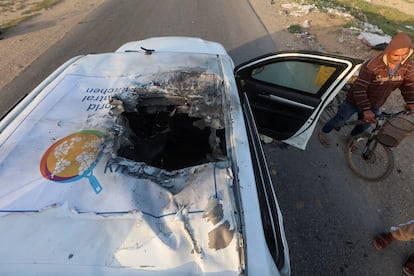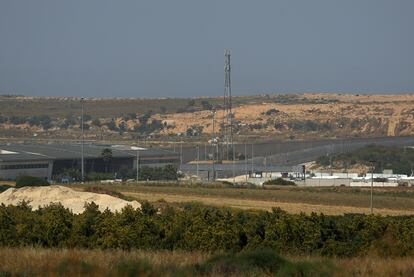Israel dismisses officers involved in WCK attack for ‘grave mistake’ in identification and decision-making
An internal IDF investigation found that its forces targeted the convoy ‘based on the misclassification of the event and misidentification of the vehicles as having Hamas operatives inside them’

Following a tense phone call between U.S. President Joe Biden and Israeli Prime Minister Benjamin Netanyahu on Thursday, Israel says it is taking steps to increase the flow of humanitarian aid into the Gaza Strip, including reopening a key border crossing into northern Gaza, where international organizations have warned about a looming famine.
Netanyahu’s office announced the plans on Friday, hours after Biden told him that future U.S. support for the war in Gaza depends on Israel taking more action to protect civilians and aid workers. The announcement did not elaborate on quantities or types of items to be allowed in.
Later on Friday, Israel also announced the dismissal of several officers involved in the deadly strike against a convoy of humanitarian aid workers that resulted in the deaths of seven people and triggered international outrage.
Biden and Netanyahu spoke by telephone on Thursday for the first time since the death of seven international aid workers from the disaster relief organization World Central Kitchen (WCK), founded by the Spanish-American chef José Andrés, in an Israeli attack in the Strip. The conversation lasted less than 30 minutes, according to the White House.
The conclusions of an internal Israeli army investigation into the bombing released Friday reveal a chain of serious errors and present some unanswered questions. The report, led by Major General Yoav Har-Even, was delivered to WCK and the ambassadors of the countries of origin of the victims. Har-Even expressed the Israel Defense Forces’ “deep sorrow about the incident” and stated that “the troops did not identify the vehicles as associated” with the NGO, despite the fact that they bore the organization’s logo visibly on their roofs and they had previously informed the Israeli army of their route and schedule using the United Nations system. “Following a misidentification by the forces, the forces targeted the three WCK vehicles based on the misclassification of the event and misidentification of the vehicles as having Hamas operatives inside them, with the resulting strike leading to the deaths of seven innocent humanitarian aid workers,” the report states.
The army admits the attack was carried out following a “grave mistake stemming from a serious failure due to a mistaken identification, errors in decision-making, and an attack contrary to the Standard Operating Procedures” of the IDF. The military authorities have dismissed a brigade chief of staff with the rank of reserve colonel and a brigade fire support officer with the rank of major. The report also formally reprimanded other senior commanders including the brigade commander, the commander of the 162nd division, and the overall chief of the Southern Command. No other measures, such as courts martial, have been mentioned.

Just hours after the phone call between Biden and Netanyahu, Israel announced it would open the border crossing of Erez, in northern Gaza, and allow the use of the port of Ashdod for direct aid deliveries. “This increase in assistance will avert a humanitarian crisis and is essential for the continuation of combat and for achieving the goals of the war,” said a statement from the Israeli Prime Minister’s Office.
The Erez border crossing, which was attacked on October 7, was the only one that a few thousand Palestinians could cross to work in Israel, go to hospitals, or visit relatives in the West Bank without having to go through Egypt. Since no one is permitted to cross it anymore and it was damaged in the Hamas attacks, it will be improvised into a goods crossing.
Erez faces directly north into the area of Gaza where at least 210,000 people are on the brink of famine, according to the United Nations. Its opening is not only important because of that, but also because the few convoys that Israel has been allowing in by land from the south risk assaults by hungry crowds or armed groups along the way.
Israel will also once again allow humanitarian aid in through the port of Ashdod, about 30 kilometers (18 miles) north of the Strip. It is one of the most important ports in the country and was the natural entry point for goods into Gaza until October 7. Since that date, the decision to use hunger as a weapon of war, and the fact that a majority of the population opposes letting humanitarian aid into Gaza while there are still Israeli hostages held there, led to its closure. Ultra-nationalist groups have demonstrated there to prevent humanitarian access, just as there have been protests at the only Israeli crossing through which aid was entering on a regular basis: Kerem Shalom, which faces the south of the Strip. The supplies will enter through three border crossings: Erez and Kerem Shalom, with Israel; and Rafah, with Egypt. Israel will also “significantly” increase access to aid provided by Jordan, an important ally of Washington.
The White House reacted to the news with a call for quick results. “These steps, including a commitment to open the Ashdod port for the direct delivery of assistance into Gaza, to open the Erez Crossing for a new route for assistance to reach north Gaza, and to significantly increase deliveries from Jordan directly into Gaza, must now be fully and rapidly implemented,” said National Security Council Spokesperson Adrienne Watson. “As the President said today on the call, U.S. policy with respect to Gaza will be determined by our assessment of Israel’s immediate action on these and other steps, including steps to protect innocent civilians and the safety of aid workers.”
Biden’s message marks a sharp change in his administration’s steadfast support for Israel’s war efforts, with the U.S. leader for the first time threatening to rethink his backing if Israel doesn’t change its tactics and allow much more humanitarian aid into Gaza.
Biden “made clear the need for Israel to announce and implement a series of specific, concrete, and measurable steps to address civilian harm, humanitarian suffering, and the safety of aid workers,” the White House said in a statement following the leaders’ call. “He made clear that U.S. policy with respect to Gaza will be determined by our assessment of Israel’s immediate action on these steps.”
But the U.S. did not mention the possibility of imposing conditions on the military aid that it provides to Israel, something that the Biden administration has systematically ruled out since the beginning of the war, despite growing internal frustration with Israel’s actions in Gaza.
The president’s warning represents his biggest rebuke since the beginning of the war and evidences the U.S. government’s growing discomfort with a conflict that has resulted in more than 33,000 Palestinian civilian deaths, with thousands more wounded and over one million at risk of starvation.
The attack against WCK workers has particularly resonated in the United States for various reasons. Among the deceased was an American-Canadian citizen. And the founder of WCK, José Andrés, is not only a celebrity chef but someone with important connections in political circles in Washington: everyone who is anyone in the capital has been to one of his restaurants, and the chef is a personal acquaintance of Biden himself, with whom he spoke immediately after the tragedy.
Imposing conditions on military aid
Internal pressure for the White House to make a move is increasing. Biden’s main ally in the Upper House, Senator Chris Coons, who describes himself as a “friend of Israel,” said Tuesday in statements to CNN that the point has been “reached” to impose conditions on military aid from the United States to Israel. And on Friday, U.S. Secretary of State Antony Blinken called for an “independent investigation” into the convoy strike.
But while Washington’s rhetoric on Israel is increasingly harsh, the fundamentals of its policy toward its ally have not changed. On Monday, before the attack against WCK aid workers, the Biden administration authorized sending more than 2,000 bombs to Israel, half of them weighing more than 200 kilos, according to CNN. Last week, Biden approved the transfer of another two thousand 1,000 kilo bombs without going through Congress.
Sign up for our weekly newsletter to get more English-language news coverage from EL PAÍS USA Edition
Tu suscripción se está usando en otro dispositivo
¿Quieres añadir otro usuario a tu suscripción?
Si continúas leyendo en este dispositivo, no se podrá leer en el otro.
FlechaTu suscripción se está usando en otro dispositivo y solo puedes acceder a EL PAÍS desde un dispositivo a la vez.
Si quieres compartir tu cuenta, cambia tu suscripción a la modalidad Premium, así podrás añadir otro usuario. Cada uno accederá con su propia cuenta de email, lo que os permitirá personalizar vuestra experiencia en EL PAÍS.
¿Tienes una suscripción de empresa? Accede aquí para contratar más cuentas.
En el caso de no saber quién está usando tu cuenta, te recomendamos cambiar tu contraseña aquí.
Si decides continuar compartiendo tu cuenta, este mensaje se mostrará en tu dispositivo y en el de la otra persona que está usando tu cuenta de forma indefinida, afectando a tu experiencia de lectura. Puedes consultar aquí los términos y condiciones de la suscripción digital.








































